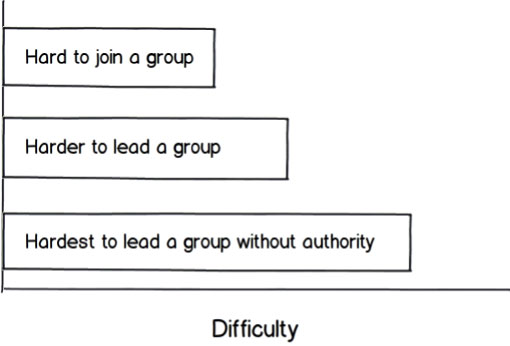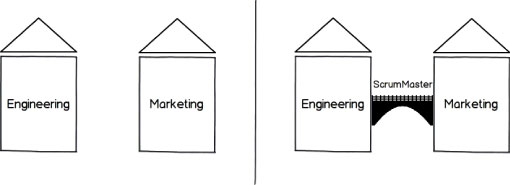I don’t believe that the important ScrumMaster title should be bestowed on someone just because he or she knows the Scrum rules and practices back to front. Instead, this title should be granted only to those who genuinely understand and can bring to life the underlying ethos of the role. That is, a ScrumMaster should truly understand what it means to be a servant-leader. Robert Greenleaf, founder of the modern-day servant-leadership movement, describes this seemingly contradictory role:
“It begins with the natural feeling that one wants to serve, to serve first. Then conscious choice brings one to aspire to lead. That person is sharply different from one who is leader first, perhaps because of the need to assuage an unusual power drive or to acquire material possessions.”
So, what does servant-leadership entail in the context of Scrum? Well, let’s look at some of the attitudes and abilities that should come naturally to a real-deal ScrumMaster.
Leading without Authority
The ability to lead without being bestowed butt-kicking privileges is the ultimate challenge for a new ScrumMaster. It is often hard to join a group, harder to lead a group, and hardest of all to lead a group without explicit authority (see Figure 1)
Ruling with extreme authority may seem easy on the surface, but any toppled dictator would agree that it is not a sustainable long-term option. Although a dictator may force results for a period of time, without the respect of his or her followers, it is only a matter of time before the so-called leadership crumbles and chaos reigns, irrespective of the force used to maintain control. A truly respected leader requires no authority and certainly no force. People want to follow this person and are inspired by this more subtle brand of leardership.
I believe that this ability is innate, though perhaps hard to develop. For those who are not quite there but are willing to try, here is a shortlist of starting points:
- Drop the ego.
- Genuinely care about both the team and the product.
- Act fairly and consistently toward all teammembers.
- Exude confidence yet humbleness at the same time.
- Make yourself extremely approachable at all times (bathroom breaks are an exception!).
Bring about Change without Fear
As Woodrow Wilson, the twenty-eigth president of the United States, put it, “If you want to make enemies, try to change something”. Change is scary to most people; it takes them out of their comfort zones into a strange new world where their status and expertise are potentially under threat. The problem for the enthusiastic new ScrumMaster is that introducing Scrum will transform a project team’s world. Even constructive change, when not handled carefully, can be viewed negatively by team members.
When joining a new Scrum team, you should not rush in and change everything at once. Be patient; observe the environment, the current practices, the individuals, the team, the technologies, and the broader organizational landscape. Be a fly on every wall, and talk to as many people as possible. Even if your mandate is to jump in and totally “scrummify” the place, first gauge the readiness of those who need to be involved. You get only one chance to make a first impression, so if you strike before the optimal time, enacting change becomes that much harder.
Find and foster allies as soon as possible. Those who have an early adopting mindset and are excited about positive change will prove invaluable in assisting you to embed new practices.
When you’re ready, start slowly, and first implement one or two initiatives (perhaps introduce the daily scrum and a consolidated product backlog). Achieve a couple of small yet decisive victories, communicate the proven benefits, and build from there. Once you have established your credibility, the environment will be much more conducive to rapidly rolling out the rest of your initiatives.
Be Diplomatic without Being Political
The ScrumMaster is the hub connecting the spokes. These spokes are the previously disconnected departments that need to be brought together in perfect harmony to function as an effective Scrum team. More often than not, there will be a deeply entrenched silo mentality in place, separating the engineering team from the marketing team (see Figure 2).
Worse than this is the sad fact that these silos are often more akin to fortresses, with barricades to keep the other “tribe” out. Breaking down this us-and-them mentality requires delicate diplomatic skills. It is about promoting broader team benefit and a healthy respect for all roles required to get the job done. The ScrumMaster should never take sides or get caught up in company politics — this is about productivity and maintaining a healthy working environment — and as we all know, politicking is mutually exclusive to both of those goals. As Kenny Rubin writes:
The ScrumMaster is transparent in all forms of communication. When working with team members there is no room for hidden agendas; what you see and hear from the ScrumMaster must be what you get.
Kenneth Rubin – Essential Scrum: A Practical Guide to the Most Popular Agile Process
Behave Selflessly without Downplaying the Role
I remember watching the Tour de France (the annual, grueling 2,500-mile cycling race) and being amazed by the sprint finish of a particularly energy-sapping stage. After the speed picked up considerably, there was an almighty mess of bikes battling toward the line. With only a few miles to go, two riders from the same team broke out of the melee, one riding in relative safety on the back wheel of the first rider, who was forced to negotiate his way through the daunting impediments all around him. After doing all the hard work, the first rider slowed down and fell back into the rest of the peloton, having spent every ounce of his energy, leaving his teammate clear of the pack to take victory. This seemingly selfless role in a cycling team is performed by the lead-out man, whose duty is to use every last vestige of his endurance and tactical thinking to protect his teammate and guide him to victory without taking individual glory. A ScrumMaster needs to perform like a lead-out man; team recognition needs to be placed above his or her own. However, just because one is selfless, it doesn’t mean that their pivotal role should be downplayed. Although the lead-out man (or woman) won’t be standing high on the podium, the role he or she plays is recognized as absolutely vital to the team’s success.
Protect without Being Overprotective
The metaphorical comparison that is commonly used when describing the role of the ScrumMaster is that of the sheepdog, guiding the flock through treacherous terrain and protecting them from hungry wolves. I like this comparison, but I also warn about taking this part of the function too far. A good ScrumMaster is careful about overassisting a team in the same way that a mom or dad (with all the very best of intentions) needs to be careful not to become a “helicopter parent” — constantly hovering and not giving the child a chance to solve his or her own problems.
The ScrumMaster needs to implicitly know when to jump in to aid the team and must also realize when it is okay just to sit back and let the team try to resolve their problems so that they can grow both personally and professionally.
Maintain Technical Knowledge without Being an Expert
Although technical experts can make great ScrumMasters, I often find that there are two big issues when the ScrumMaster is either a technical or domain expert:
- When a team member is stuck, it can be awfully tempting to jump in too early to help him or her resolve the problem.
- The desire will be strong to get overly involved in the technical/functional details within the sprint planning sessions (see Sprint Planning – Plan the Sprint then Sprint the Plan). In these situations, the ScrumMaster can potentially become distracted from the core facilitation responsibilities.
Be Comfortable Never Finishing
A ScrumMaster may reach a glorious day when he or she looks at the team and is tempted to say, “Wow, we totally rock! There really isn’t anything more I can do to improve things here.” No matter how well things are humming along, remember that achieving perfection is an impossible ambition, and improvements can always be made. Furthermore, a team will change over time, through natural attrition, promotion, and in some (unfortunate) cases expulsion, so when these dynamics change, there will be plenty of work to do and improvements to be made.
Next Generation Leadership
Genuine ScrumMasters form part of a new generation of enlightened professionals. The role of the ScrumMaster is deep and complex and should never be seen simply as a laundry list of operational functions—it is important to look deeper below the surface to find the foundational roots and understand what they are about.
Finally, I implore organizations to remain open-minded when trying to identify future ScrumMasters because they may originate from any background. They are people who can successfully demonstrate the abilities discussed in this article, and although not everyone can be a ScrumMaster, a ScrumMaster can be anyone.
If you liked this article, you can:
Subscribe to this RSS feed!
Find out more about being a ScrumMaster by taking one of our CSM training courses.







